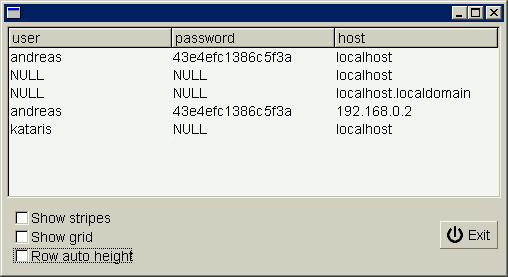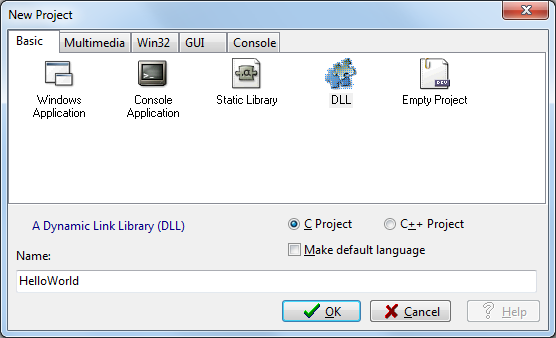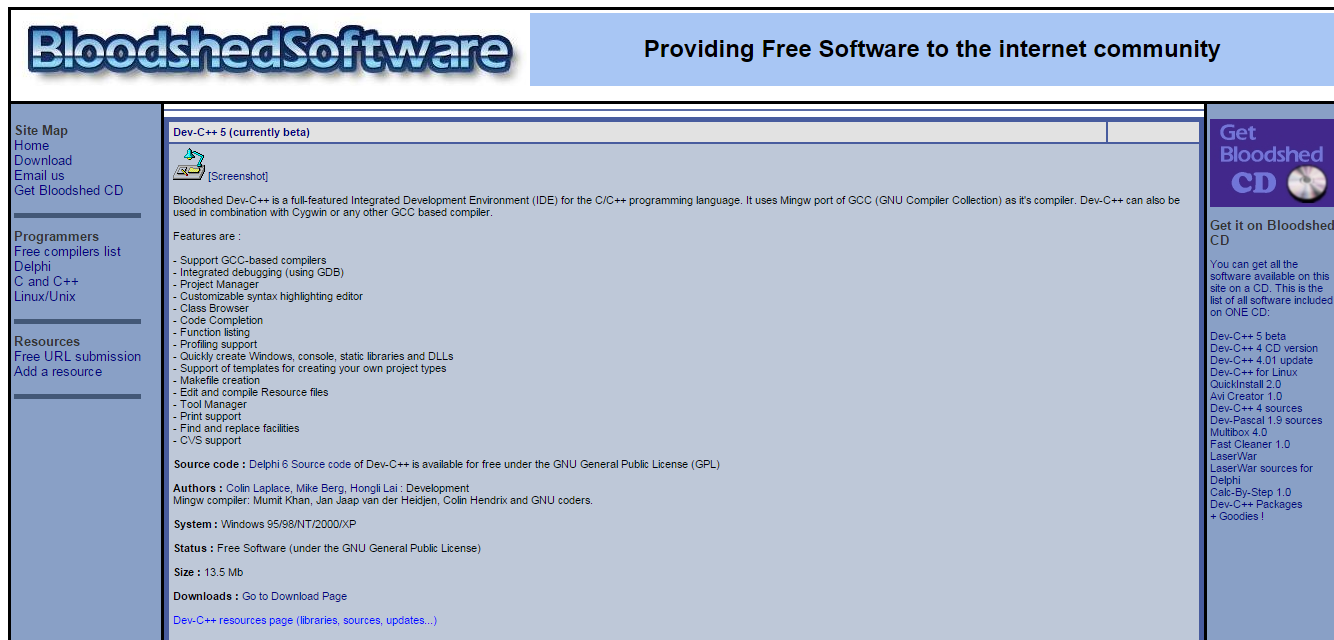From the filtered list of project types, select Dynamic-link Library (DLL), and then choose Next. In the Configure your new project page, enter MathLibrary in the Project name box to specify a name for the project. Leave the default Location and Solution name values. Set Solution to Create new solution.
- DLL Tutorial
- DLL Useful Resources
- Selected Reading
C++ To Dll
First, we will discuss the issues and the requirements that you should consider while developing your own DLLs.
Types of DLLs
When you load a DLL in an application, two methods of linking let you call the exported DLL functions. The two methods of linking are −
- load-time dynamic linking, and
- run-time dynamic linking.
Load-time dynamic linking
In load-time dynamic linking, an application makes explicit calls to the exported DLL functions like local functions. To use load-time dynamic linking, provide a header (.h) file and an import library (.lib) file, when you compile and link the application. When you do this, the linker will provide the system with the information that is required to load the DLL and resolve the exported DLL function locations at load time.
Runtime dynamic linking
In runtime dynamic linking, an application calls either the LoadLibrary function or the LoadLibraryEx function to load the DLL at runtime. After the DLL is successfully loaded, you use the GetProcAddress function, to obtain the address of the exported DLL function that you want to call. When you use runtime dynamic linking, you do not need an import library file.
The following list describes the application criteria for choosing between load-time dynamic linking and runtime dynamic linking −
Startup performance − If the initial startup performance of the application is important, you should use run-time dynamic linking.
Ease of use − In load-time dynamic linking, the exported DLL functions are like local functions. It helps you call these functions easily.
Application logic − In runtime dynamic linking, an application can branch to load different modules as required. This is important when you develop multiple-language versions.
The DLL Entry Point
When you create a DLL, you can optionally specify an entry point function. The entry point function is called when processes or threads attach themselves to the DLL or detach themselves from the DLL. You can use the entry point function to initialize or destroy data structures as required by the DLL.
Additionally, if the application is multithreaded, you can use thread local storage (TLS) to allocate memory that is private to each thread in the entry point function. The following code is an example of the DLL entry point function.
When the entry point function returns a FALSE value, the application will not start if you are using load-time dynamic linking. If you are using runtime dynamic linking, only the individual DLL will not load.
The entry point function should only perform simple initialization tasks and should not call any other DLL loading or termination functions. For example, in the entry point function, you should not directly or indirectly call the LoadLibrary function or the LoadLibraryEx function. Additionally, you should not call the FreeLibrary function when the process is terminating.
WARNING − In multithreaded applications, make sure that access to the DLL global data is synchronized (thread safe) to avoid possible data corruption. To do this, use TLS to provide unique data for each thread.
Exporting DLL Functions
To export DLL functions, you can either add a function keyword to the exported DLL functions or create a module definition (.def) file that lists the exported DLL functions.
To use a function keyword, you must declare each function that you want to export with the following keyword −
To use exported DLL functions in the application, you must declare each function that you want to import with the following keyword −
Typically, you would use one header file having define statement and an ifdef statement to separate the export statement and the import statement.
Dev C++ Example Programs
You can also use a module definition file to declare exported DLL functions. When you use a module definition file, you do not have to add the function keyword to the exported DLL functions. In the module definition file, you declare the LIBRARY statement and the EXPORTS statement for the DLL. The following code is an example of a definition file.
Write a Sample DLL
In Microsoft Visual C++ 6.0, you can create a DLL by selecting either the Win32 Dynamic-Link Library project type or the MFC AppWizard (dll) project type.
The following code is an example of a DLL that was created in Visual C++ by using the Win32 Dynamic-Link Library project type.
Calling a Sample DLL
The following code is an example of a Win32 Application project that calls the exported DLL function in the SampleDLL DLL.
NOTE − In load-time dynamic linking, you must link the SampleDLL.lib import library that is created when you build the SampleDLL project.
In runtime dynamic linking, you use code that is similar to the following code to call the SampleDLL.dll exported DLL function.
When you compile and link the SampleDLL application, the Windows operating system searches for the SampleDLL DLL in the following locations in this order −
The application folder
The current folder
The Windows system folder (The GetSystemDirectory function returns the path of the Windows system folder).
The Windows folder (The GetWindowsDirectory function returns the path of the Windows folder).
How to Install Dev-C++ and the GLUT Libraries
for Compiling OpenGL Programs with ANSI C
(version of July 16, 2009)
These notes explain how to compile programs written in ANSI C with OpenGL and GLUT using the Dev-C++ compiler.
Bloodshed Dev-C++ is a free C++ compiler and development environment for Windows operating systems. Like most C++ compilers, it also can be used to compile ANSI C. By installing the GLUT header and library files, it can be used to write programs that use OpenGL. This is needed to run programs for Edward Angel's textbook, Interactive Computer Graphics 5th edition and possibly other computer graphics texts.
These notes do not explain how to compile OpenGL with C++ . The 6th edition of Angel's book uses C++ which will not work with these notes.
These instructions have been tested on a small variety of Windows 2000 and Windows XP systems. These systems come with the files needed for OpenGL, but not the files needed for GLUT.
Dev-C++ does not work well with Microsoft's Vista. The problem, and a possible fix, is discussed here: http://aresio.blogspot.com/2007/06/vista-and-dev-cpp.html but I have not tested this information.
I. Download Dev-C++ from http://www.bloodshed.net/dev/devcpp.html and install it.
Details:
Get Dev-C++ 5.0 beta 9.2 (4.9.9.2) (9.0 MB) with Mingw/GCC 3.4.2 Although this is a 'beta' version, it works perfectly fine. Click on SourceForge to go to a list of download sites and pick one. The file will be something like devcpp4.9.9.2_setup.exe. Save this file in a place like C:Temp.

When the download is complete, click on the 'open' button to start the installation process. (Or go to C:Temp andDouble click on devcpp4.9.9.2_setup.exe). You will see a few screens that ask you to pick a language (English) and to agree to the license terms. Choose a 'typical' installation.
Accept the suggested destination for the installation:
Many subdirectories and files are extracted to the destintion:
Answer 'yes' when it asks if you wish to install Dev-cpp for all users. Note: if the installation fails, re-install and try 'no' for this.
A screen says the installation is complete:
Keep the check mark in the box. Click on 'Finish'. A first-time configuration screen appears:
Pick 'English' and 'New Look'. In the next several screens, hit 'Yes' for its suggestions.
Eventually you are done. Click 'OK'.
II. DEV-C++ starts up. Try out the installation with a simple C program.
Details:
Visual Studio C++ Dll Example
The program starts up automatically.
Click File/New/Project. Pick a name for the project (such as 'myProject'). Click 'C Project'. Click on 'Empty Project'. Click 'OK'.
In 'Create New Project', click 'save' (later on you will probably want to create separate subdirectories for your various projects.).
Click 'File/New/Source File' and in 'Add source file to current project' click 'Yes'. You now get a screen where you can edit the source file.
Type in a simple C program, as below. Now click 'File/Save As' and save the file as 'hello.c' (or other name.) Important: be sure that the file extension is .c. With any other extension (such as the suggested .cpp) you will have problems compiling.
Now click 'Execute/Compile and Run'
The program will (hopefully) compile, run, and write its output to a DOS window. If you have the system('pause') statement in your program, the output will stay in the window until you hit a key. Another way to run the program (after it has been compiled) is to start a DOS window outside of the Dev-Cpp system, then navigate to the subdirectory that holds your project, and type hello.exe.
At this point, the compiler and development environment has been installed. You should find Dev-C++ listed under 'Programs' on the 'Start' menu and will now be able to write, compile, and run C (and C++) programs. You will have include files, libraries, and dll's for OpenGL (and all other standard packages) but not GLUT. GLUT manages the windows and other user interface components needed for OpenGL programming, and needs to be separately installed.
If you do not need GLUT , you can quit now.
Create Dll In Dev C++
III. Download and install GLUT
To run OpenGL with GLUT (which is what the programs in Angel's book use), you need to get three files and place each file in its proper directory. All the files you need (and more) are contained in one zip file.
Details:
Download GLUT files from http://chortle.ccsu.edu/Bloodshed/glutming.zip Download the file glutming.zip Save the zip file in some convenient location (perhaps C:temp).

Double click on glutming.zip (or otherwise unzip it). You will see the files that are in the zip archive. (Your un-zipping program will probably be diferent than the one shown here, but should work about the same.)
Click on 'Extract' to extract all the subdirectories and files. Pick some convenient directory to extract them to (perhaps C:tempglutming). You only need three files, but extract all of them anyway.
Only three of the files in the various subdirectories are needed. Each of the three files should be put in a subdirectory with other files of its type. Use Explorer to move the files to where they are needed.
Note: If you only see some of these files listed in Explorer, click on 'View/Options/View' and then select the radio button 'Show all Files'.
glut.h -- copy this file to C:Dev-CppincludeGL
Copy from your 'unzipped' subdirectories (wherever they are):
To here:
libglut32.a -- copy this file from your unzipped directories to C:Dev-Cpplib
There may be a newer version of this file there, already. Replace that version with the one you unzipped (if you keep the newer version your programs will not link correctly.)
Copy from your 'unzipped' subdirectories:
To here:
glut32.dll -- move this file to C:WINNTSystem32, or similar location.
The location for this file depends on your operating system. The directory where it goes is the directory that holds the dynamic load libraries (*.dll). An easy way to find where it should go is to look for glu32.dll (use 'Search' from the start menu).
The directory to use should also have the files glu32.dll and opengl32.dll. These should have come with your operating system.
IV. Test Dev-cpp with GLUT
The essential step in compiling and running a C program that contains OpenGL and GLUT functions is to tell the linker where the libraries are. This is done by clicking Project/Project Options/Parameters/Add Library or Options and then navigating to the libraries you need to include: libopengl32.a, libglu32.a, and libglut32.a. The libraries should be added in that order.
Details:
a. Create a subdirectory for a project. Do this first, before you start Dev-Cpp. Create a new subdirectory with 'Explorer' by clicking 'File/New/Folder'.
For example, create a folder C:GLproject.
b. Start Dev-cpp:
c. Start a new project by clicking File/New/Project. In the panel that pops up, name the project something like 'rectangle', click on 'empty project' and 'C': Click OK.
Note: For compiling with OpenGL you must create a project. You need to have a project (not just a single C file) in order to link in the OpenGL libraries.
d. In the next panel, navigate to your folder C:GLproject, and click 'Save'.
e. In Dev-C++, click 'File/New/Source File' and then in the next panel 'Add to Project' click 'yes'. Click 'File/Save As' and then give the file a name. Navigate to your project subdirectory to save the file in it. Name the file something like 'rectangle.c'

Be sure that the file names ends with '.c' anything else will cause big problems.
f. Click and drag your mouse over the following program so that it is highlighted, then click 'Edit/Copy' from the browser's menu bar.
g. Now click in the editing window of Dev-cpp and then click 'Edit/Paste' in its menu bar. The program will appear in the editing window.
h. Click 'File/Save'. The file in your project directory should now contain an OpenGL program.
i. Tell Dev-cpp what libraries need to be linked. Click 'Project/Project Options'.
j. Now click 'Parameters'. Click the 'Add Library or Object' button and navigate to the libraries that should be added, found under C:Dev-cpplib
- ../lib/libopengl32.a
- ../lib/libglu32.a
- ../lib/libglut32.a
Add them in that order (only). Notice that the slashes will appear in Unix style '/' rather than DOS-style '.
When you are done adding the three libaries, you should see:
The exact pattern of '../../..' you see depends on how deep in the directory structure your source file lies.
Click 'OK'.
k. Click 'Execute/Compile and Run'. The program should compile, link, and run:
If things don't work (very common) click on the 'Compile Log' tab for some confusing error messages. If you see something like the following, it means that you made a mistake in adding the libraries to the project:
Dev C++ Dll Example Pdf
Try to fix the list of libraries, or perhaps start over from scratch.
Windows Dll Example
You now are finished, or have given up.